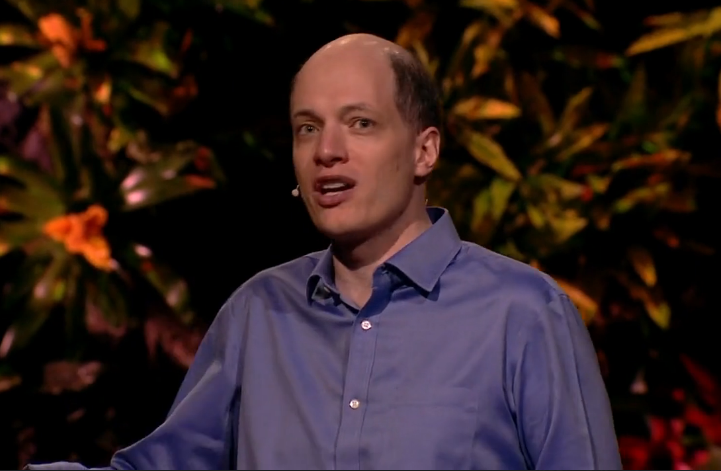In the secular world we think, "If an idea is important, I'll bump into it. I'll just come across it."
在非宗教世界里,我們覺得 "我會(huì)毫無預(yù)兆就想到一個(gè)好主意,我是偶然想到的"
Nonsense, says the religious world view.
宗教人士會(huì)說 "胡扯"
Religious view says we need calendars, we need to structure time, we need to synchronize encounters.
宗教人士覺得我們需要日歷,需要安排好時(shí)間,我們需要同步好想法和時(shí)間
This comes across also in the way in which religions set up rituals around important feelings.
這還幫助宗教們安排傳統(tǒng)儀式和感受到特定的感情
Take the Moon. It's really important to look at the Moon.
就像月亮,看月亮是非常重要的
You know, when you look at the Moon, you think, "I'm really small. What are my problems?"
你看月亮的時(shí)候,你會(huì)想 "我真渺小,我有什么問題呢"
It sets things into perspective, etc., etc.
這幫助你從不同角度看世界
We should all look at the Moon a bit more often. We don't.
我們應(yīng)該經(jīng)常賞月,可是我們不這么做
Why don't we? Well there's nothing to tell us, "Look at the Moon."
為什么呢,因?yàn)楣饪丛铝敛粫?huì)給我們什么信息

But if you're a Zen Buddhist in the middle of September,
但如果你是個(gè)信禪的,在九月中旬
you will be ordered out of your home, made to stand on a canonical platform and made to celebrate the festival of Tsukimi,
你會(huì)去一個(gè)專門的站臺(tái)上,去慶祝月見節(jié)日
where you will be given poems to read in honor of the Moon and the passage of time
你會(huì)吟詩去贊賞月亮,你會(huì)閱讀關(guān)于時(shí)間的文章
and the frailty of life that it should remind us of.
你會(huì)被重新提醒關(guān)于生命的脆弱
You'll be handed rice cakes.
你會(huì)收到米糕
And the Moon and the reflection on the Moon will have a secure place in your heart. That's very good.
而月亮和它的倒影會(huì)讓你感到內(nèi)心中的一片凈土。這是很好的事情
The other thing that religions are really aware of is: speak well
宗教還注重另外一件事情就是去好好說話發(fā)言
I'm not doing a very good job of this here -- but oratory, oratory is absolutely key to religions.
雖然我的演講不是很出色,但是演講術(shù)對(duì)宗教來說是非常關(guān)鍵的
In the secular world, you can come through the university system and be a lousy speaker and still have a great career.
在非宗教世界里,你仍然可以有個(gè)很好的工作,即使你演講說的很糟糕
But the religious world doesn't think that way.
但是在宗教世界里不是這樣的
What you're saying needs to be backed up by a really convincing way of saying it.
你說的話必須要有說服力,去支持你的論點(diǎn)
So if you go to an African-American Pentecostalist church in the American South
如果你去一個(gè)在美國南部的非洲美國五旬節(jié)教會(huì)
and you listen to how they talk, my goodness, they talk well.
你會(huì)知道他們的演講是如何出色
After every convincing point, people will go, "Amen, amen, amen."
每在說得好的地方,大家會(huì)說"阿門,阿門,阿門"
At the end of a really rousing paragraph, they'll all stand up,
在最后一段振奮人心的地方,大家都會(huì)站起來
and they'll go, "Thank you Jesus, thank you Christ, thank you Savior."
他們說 "謝謝你耶穌,謝謝上帝,謝謝救世主"
If we were doing it like they do it -- let's not do it, but if we were to do it --
如果我們像他們那樣做--好吧算了,但如果我們真的做了--
I would tell you something like, "Culture should replace scripture."
我會(huì)告訴你們,文明文化應(yīng)該代替教典
And you would go, "Amen, amen, amen."
然后你們會(huì)說 "阿門,阿門,阿門"
And at the end of my talk, you would all stand up and you would go, "Thank you Plato, thank you Shakespeare, thank you Jane Austen."
我演講完的時(shí)候,你們應(yīng)該都站起來,然后說 "謝謝你柏拉圖,謝謝莎士比亞,謝謝簡(jiǎn)·奧斯汀"
And we'd know that we had a real rhythm going.
我們都知道你們會(huì)說的很好
All right, all right. We're getting there. We're getting there.
好了,快說到重點(diǎn)了



